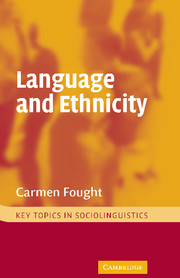Book contents
- Frontmatter
- Contents
- Preface
- Acknowledgments
- Part I General issues in ethnicity and language
- Part II Linguistic features and ethnicity in specific groups
- Part III The role of language use in ethnicity
- 8 Discourse features, pragmatics, and ethnicity
- 9 Interethnic communication and language prejudice
- 10 Crossing: may I borrow your ethnicity?
- Notes
- Glossary of terms
- References
- Index
- References
8 - Discourse features, pragmatics, and ethnicity
Published online by Cambridge University Press: 05 September 2012
- Frontmatter
- Contents
- Preface
- Acknowledgments
- Part I General issues in ethnicity and language
- Part II Linguistic features and ethnicity in specific groups
- Part III The role of language use in ethnicity
- 8 Discourse features, pragmatics, and ethnicity
- 9 Interethnic communication and language prejudice
- 10 Crossing: may I borrow your ethnicity?
- Notes
- Glossary of terms
- References
- Index
- References
Summary
Delilah: You look good!
Stella: That's cause you don't know good from spectacular!
(from the movie How Stella Got Her Groove Back, 1998)When my two cousins came from Spain to attend an American college for a year, they quickly became friends with other foreign students there. In particular, they told me, they had met two girls from Japan whom they liked very much. The funny thing, they reported, was how quiet the Japanese girls were. They were very nice, my cousins assured me, but they never seemed to hold up their end of the conversation. They just didn't have a lot to say. It was easy for me, as a linguist, to guess from this account that the norms for how long one should wait before taking a turn must be much shorter in Spanish than in Japanese. The Japanese girls were waiting for a pause of at least X milliseconds before they felt that it was OK for them to come in. My cousins were leaving the much shorter pause appropriate to the Spanish turn-taking system, and when the other party hadn't said anything yet, they went on to fill what would otherwise be an “awkward” silence. I imagined the Japanese girls at home talking to their own American cousin (We met two Spanish girls. They're very nice, but they can't seem to stop themselves from talking! They never give anyone else a chance!).
- Type
- Chapter
- Information
- Language and Ethnicity , pp. 155 - 171Publisher: Cambridge University PressPrint publication year: 2006



